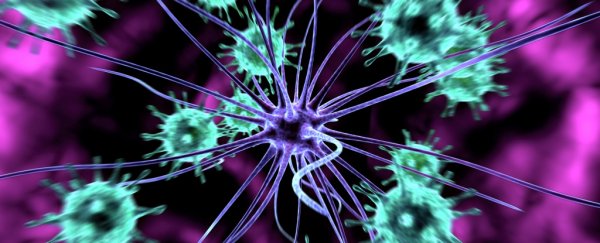A class of self-reactive immune cells long considered useless or even dangerous to our health, could actually be a kind of secret weapon - lying in wait inside our bodies to fight off dangerous infections.
Using mice, researchers in Australia have discovered that so-called 'silenced' B cells – lymphocytes that are seemingly dormant, but which when activated can harm our own bodies in autoimmune conditions – can be 'redeemed' to attack harmful microbes our immune systems otherwise struggle to fight off.
"The big question about these cells has been why they are there at all, and in such large numbers," explains immunogenomics researcher Chris Goodnow from the Garvan Institute of Medical Research.
"Why does the body keep these cells, whose self binding antibodies pose a genuine risk to health, instead of destroying them completely, as we once thought?"
It now looks like we have an answer. Goodnow, who 30 years ago helped discover these silenced, self-reactive B cells, says the genetic machinery that makes the cells produce antibodies to attack our body's own tissues can be adapted to instead combat foreign infections.
What's so exciting here is that the adaptation essentially represents a new kind of immunity we never knew about.
This finding could pave the way to discovering new vaccines to fight infections like HIV and campylobacter, which hide from our immune systems by effectively mimicking our own biological material.
"This completely changes everyone's thinking about how the immune system works – and it solves this problem of telling the difference between invaders and self," Goodnow told The Australian Financial Review.
"The idea that you could start with a bad antibody and make it good just hasn't been in anyone's lexicon."
The findings, which so far have been demonstrated in a mouse model, show how DNA mutations of antibody genes in germinal centres – where B cells activate during immune response – reprogram these self-reactive antibodies, making them stop binding to mouse tissue, and increasing their binding capacity to foreign invaders by up to 5,000 times.
"We've shown that these silenced cells do have a crucial purpose," says first author of the study, Deborah Burnett, in a press release.
"Far from 'clogging up' the immune system for no good reason, they're providing weapons to fight off invaders whose 'wolf in sheep's clothing' tactics make it almost impossible for the other cells of the immune system to fight them."
Now that we know about how this hypermutation in the germinal centre can take place, the researchers are hopeful it could one day lead to new kinds of treatments for dangerous human infections, which are able to evade and elude our bodies' conventional immune responses.
"The idea that self-reactive cells can contribute to immunity through germinal centre redemption may be particularly important in responses to pathogens that cloak themselves in host antigens to avoid immunity," explain immunologists Ervin E. Kara and Michel C. Nussenzweig from The Rockefeller University, in a commentary on the findings.
"HIV-1 is one such pathogen."
It's a remarkable turnaround for a class of immune cells long mistaken for dangerous junk – and one which shows there's still so much we have to learn about what the immune system can do for us, and how its less than perfectly obvious mechanisms might be leveraged to do us good.
"We now know that every immune cell is precious when it comes to fighting invading microbes," says Goodnow, "and we've learned that the immune system recycles, conserves, and polishes up its 'bad apples' instead of throwing them away."
The findings are reported in Science.
